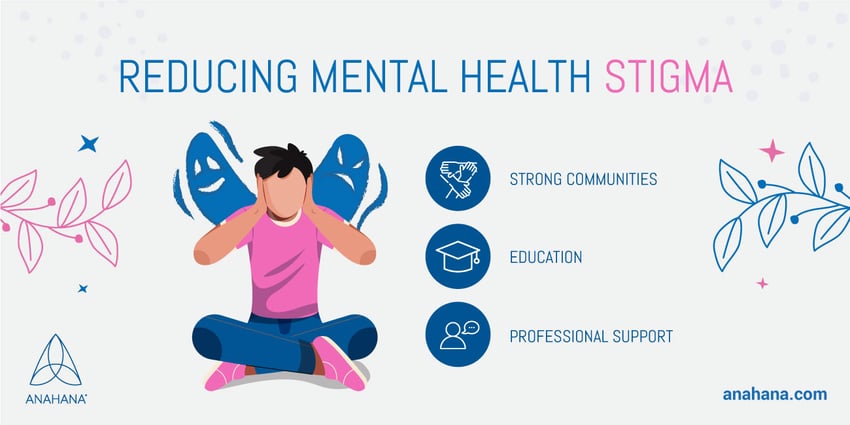
Table of Contents
Mental health stigma refers to negative attitudes and feelings towards people with mental health challenges. Mental health can prevent people from seeking mental illness treatment and can negatively affect people in their social, work, and personal lives.
Key Takeaways
- Mental health stigma involves negative attitudes toward those with mental health challenges, leading to discrimination and barriers to treatment.
- Education and understanding can reduce stigma, promoting empathy and support for individuals with mental health issues.
- Community support and inclusive environments are crucial in fighting stigma and supporting mental health recovery.
Mental Health Stigma
The term stigma generally refers to negative attitudes towards something or someone. When looking at mental illness, mental health stigma usually involves a person with mental health challenges being discredited, ignored, or reduced from a whole person to a stereotype.
Historically, people with mental illness and mental health issues have been called harmful terms such as “psychotic,” “disturbed,” “crazy,” or “insane.” Discrimination can commonly occur due to the stigma of mental illness, which can have very harmful effects. Mental health stigma is a barrier to diagnosing and treating mental health conditions.
Why Is There a Mental Health Stigma?
Stigma generally comes from a lack of education or understanding. People are then quick to judge and label stereotypes as facts, which is why mental health issues are often dismissed or ignored. Although there has been some improvement in mental health education, the mental health stigma still exists today.
According to one study, recently, there have been significant changes in public stigma toward mental illness. Public stigma towards major depression has decreased in the past twenty-two years. However, the public stigma for other mental illnesses, such as schizophrenia or alcohol dependence, has not changed.
Interestingly, there has also been an increase in the public acceptance of the biomedical causes of mental illnesses. Over time, people were more likely to accept that a genetic or biochemical issue can cause mental illnesses.
Mental Health Stigma Examples
Many types of mental health stigmas exist. Some categories of stigma include public, institutional, and self-stigma though this is not a complete list. Discrimination, stereotypes, and prejudices are also words often associated with stigma, as much of the stigma is rooted in these concepts.
One example under the idea of stereotypes and prejudices would be the stereotype that mentally ill people are dangerous, incompetent, to blame for their disorder, and unpredictable. This example would fall under public stigma, a more general belief. In this case, external factors such as representations of people with mental illness in the media may influence this belief.
Institutional stigma involves policies and actions of large institutions that either intentionally or unintentionally negatively affect people with mental illnesses.
Self-stigma is when people with a mental illness have negative thoughts and attitudes toward themselves due to their mental illness. An example of self-stigma would be people with mental illness feeling like they are not capable or are to blame for their mental illness.
Racial and Ethnic Influences on Mental Health Stigma
The stigma around serious mental illness can be a significant issue, especially in certain racial and ethnic communities. Therefore, people in these cultures can experience a more significant barrier to seeking mental health services.
One example would be in certain Asian cultures, where seeking professional help for people with mental illness is looked down upon. It counters certain cultural values such as strong family ties, emotional restraint, and avoiding shame.
Additionally, among other groups in the African American community, there is a general distrust toward the mental healthcare system, which can prevent people from seeking formal mental health treatment.
Negative Effects of Mental Health Stigma

Mental illness stigma prevents, on average, forty percent of people with anxiety or depression from seeking medical help, according to mental health statistics. It can seriously affect people’s well-being, change how they view themselves and their entire self-concept and lead to self-stigma towards their mental health conditions.
Mental illness stigma can affect people with mental illness during all stages of their mental health journey, whether that be while they are undergoing mental health treatment, beginning their healing, or recovering.
Hesitation Towards Seeking Help
Along with the difficulty of access to mental health support and fear of adverse outcomes, stigmatizing negative beliefs are among the most significant barriers to seeking help for emotional or mental health difficulties.
At the institutional level, legislation, funding, and the availability of services for mental health can be significant barriers for mentally ill persons. At the community level, general public attitudes and behaviors toward mental illness are significant barriers.
Ongoing research suggests that those living in countries with higher rates of help-seeking, treatment utilization, better access to information on mental health management, and less stigmatizing attitudes tend to have lower rates of self-stigma and perceived discrimination.
Though at a global level, stigmatizing attitudes still exist. Specifically, reluctant beliefs about the effectiveness of treatment and mental health services at the start of treatment have been shown to influence mental health treatment behavior.
Mental Health Stigma in Society
Mental health stigma is a significant public health concern. Due to the recent acknowledgment of mental health stigma, many countries, such as Canada, New Zealand, Denmark, and the United Kingdom, have developed public health programs to address mental health conditions.
Within the United Kingdom, anti-stigma programs are aimed at various groups and operate at several levels to support people’s mental health. These include national social marketing campaigns and small community groups. Though these programs are in place, data is not yet available on their effectiveness.
Mental Health Stigma in the Professional Setting
Work can be positive for mental health; it can provide a livelihood, a sense of confidence, an opportunity for positive relationships, and several other benefits. However, poor working environments, including discrimination and inequality, excessive workloads, low job control, and insecurity, can all lead to poor mental health issues.
There is a large percentage of working-age adults reported having a mental disorder. Given this statistic, it is clear that work environments that support mental health and mental health conditions need to be encouraged. There are practical actions that can prevent mental health risks, protect and promote health, and support workers with these conditions.
Some recommended strategies are to have managers trained in mental health strategies, train workers in mental health literacy, and implement interventions and opportunities for individuals with mental health conditions.
It is an important issue to discuss; a national poll from the American Psychiatric Association (APA) found that mental health stigma was a significant challenge within the workplace.
Half of the workers were concerned about discussing mental health conditions and issues at their jobs, and more than a third were concerned about being pushed back or fired if they sought mental health care for their mental health conditions.
Though there is a generational gap, millennials were likelier to speak about their mental health conditions than baby boomers.
Mental Health Stigma in Social Settings
As stigma is a social phenomenon, this stigma can commonly occur within social settings. Whether around peers, friends, or family members, a person who is a stigma victim may feel they are being treated differently and excluded from many things within society due to their mental health. It is called social stigma.
Those with serious mental illness may identify and become labeled with their condition, thus becoming vulnerable to prejudice and mental health discrimination.
It can lead to low self-esteem and self-stigma, hesitation towards mental health treatment, delay in seeking treatment, and withdrawal from society in general.
Therefore, it is clear that stigma within social stigma can worsen already existing mental health issues and downplay mental health conditions.
Addressing Mental Health Stigma

Many changes can help to reduce the mental health stigma. The first is education; knowing the facts and research about mental illness and mental health condition, can help people empathize with those with a mental health disorder.
Awareness of attitudes and behavior is also essential, particularly in catching judgmental thinking and previous stereotypical beliefs about mental health.
Along with this is language, choosing words carefully, and being intentional with what is communicated to those with mental health conditions.
Educating others and sharing knowledge can also be highly effective, especially in combating myths and negative stereotypes about mental health concerns.
Supporting those with mental health challenges and focusing on the positive can help reduce stigma as it can aid people with mental health conditions in regaining their self-concept.
Lastly, encouraging equality and inclusion is essential, as discrimination against those with mental health problems is prevalent.
Building Stronger Communities for Mental Health
One of the most effective ways for those struggling with mental illness to help heal is to utilize resources and gain support for their mental health. Building stronger communities means creating a support group with people one trusts.
These communities can be made of a close circle of family members and friends or even expand to mental health professionals, local community health centers, and local community mental health centers.
There are around seven types of social support that exist; these include emotional support, informational support, tangible support, affirmational support, and belonging support. Starting in one area can open opportunities for others to explore and create a more positive atmosphere.
Education Around Mental Health Stigma
Education is instrumental in reducing the stigma, allowing people to gain perspective and understanding. As previously mentioned, certain countries have taken approaches at the national level to combat mental health stigma and raise awareness for mental health.
Some schools have taken action to reduce mental health stigma. For example, schools are beginning to incorporate anti-stigma practices in a culturally inclusive manner, and there is an increased priority for schools to target mental health issues.
Community awareness campaigns, curriculum-based learning programs, and safe and supportive environments are becoming more common. Although schools and other institutions are taking action towards raising awareness of mental health and reducing stigma regarding mental illness, further work can still be done.
Resources
Psychiatry.org - Stigma, Prejudice, and Discrimination Against People with Mental Illness
Mental illness stigma - dealing with stigma and how to reduce it | healthdirect
Mental Illness Stigma, Help Seeking, and Public Health Programs - PMC
Understanding the Different Types of Social Support | Home Base
Reducing mental health stigma in schools
Disclaimer
The contents of this article are provided for informational purposes only and are not intended to substitute for professional medical advice, diagnosis, or treatment. It is always recommended to consult with a qualified healthcare provider before making any health-related changes or if you have any questions or concerns about your health. Anahana is not liable for any errors, omissions, or consequences that may occur from using the information provided.

By: Lujayn Mostafa
Lujayn (Lulu) is a Anahana writer and editor as well as a soon to be a graduate of the M.Ed. in Developmental Psychology and Education program at OISE, University of Toronto. She holds a B.A. in Psychology from The American University in Cairo, with a double minor in Anthropology and Educational Studies.